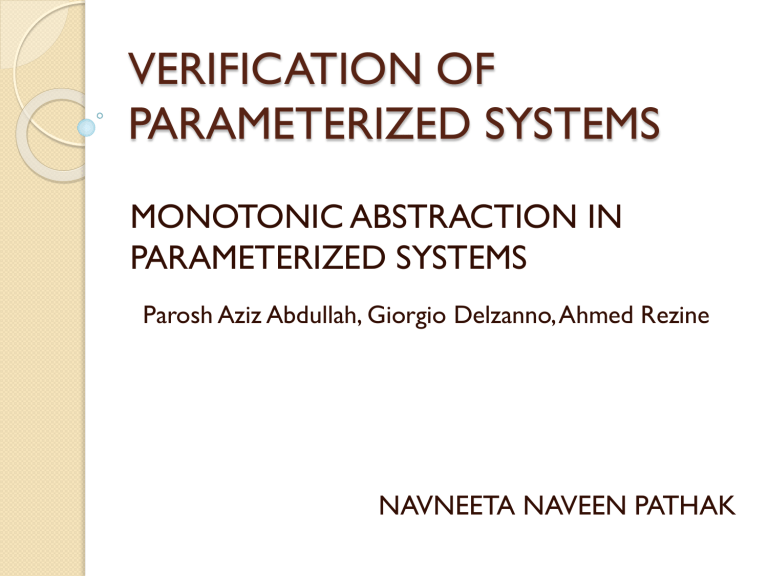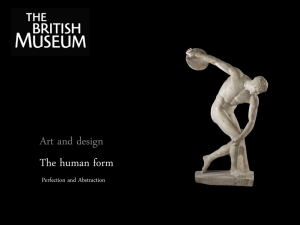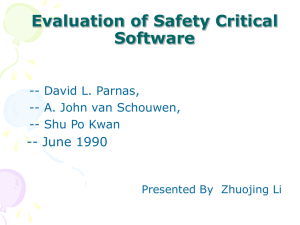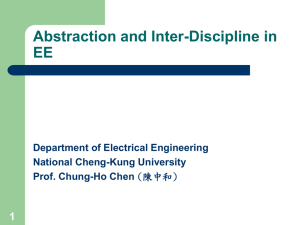PPT

VERIFICATION OF
PARAMETERIZED SYSTEMS
MONOTONIC ABSTRACTION IN
PARAMETERIZED SYSTEMS
Parosh Aziz Abdullah, Giorgio Delzanno, Ahmed Rezine
NAVNEETA NAVEEN PATHAK
AGENDA
INTRODUCTION
PARAMETERIZED SYSTEMS
TRANSITION SYSTEMS
ORDERING
MONOTONIC ABSTRACTION
Monotonic Abstraction in Parameterized Systems 2
INTRODUCTION
Monotonic Abstraction as a simple and effective method to prove safety properties for
Parameterized Systems with linear topologies.
Main idea : Monotonic Abstraction for considering a transition relation that is an overapproximation of the one induced by the parameterized system.
Monotonic Abstraction in Parameterized Systems 3
MODEL CHECKING + ABSTRACTION
Infinite-State
System
Abstraction
Model
Checking
Finite-State
System
Monotonic Abstraction in Parameterized Systems 4
AGENDA
INTRODUCTION
PARAMETERIZED SYSTEMS
TRANSITION SYSTEMS
ORDERING
MONOTONIC ABSTRACTION
Monotonic Abstraction in Parameterized Systems 5
PARAMETERIZED SYSTEMS
P
1
P
2
P
3
..........
P
N
P
2
.........
P
1
P
4
P
N
P
3
.........
AIM : To verify correctness of the systems for the whole family of Parameterized Systems.
Monotonic Abstraction in Parameterized Systems 6
DEFINITION
A parameterized system P is a triple (Q,X, T ),
Q - set of local states,
X - set of local variables,
T - set of transition rules.
A transition rule t is of the form: t: [ q | grd → stmt | q´ ] where q, q´ ϵ Q grd → stmt is a guarded command grd ϵ B(X) U G(X U Q) stmt : set of assignments
Monotonic Abstraction in Parameterized Systems 7
A process moves from
Idle to Black state when it wants to access its critical section.
Parameterized System, P = (Q,T)
Q = {Green, Black, Blue, Red} and T = {t where t t
2, t
1,
3 t
5, t
4 t
6
– Existential Rule
Idle State – Initially all
– Universal Rules state t
2, t
3.
– Local transition rules processes are in this t
4, t
5,
Once a process moves from Black to Blue state, it
“closes the door” on all processes in
Idle state
V LR t
2 t
1 t
6 t
5 t
6
}
Critical State –
Eventually a process will enter this state
∃ L t
3 t
V L
4
Monotonic Abstraction in Parameterized Systems 8
AGENDA
INTRODUCTION
PARAMETERIZED SYSTEMS
TRANSITION SYSTEMS
ORDERING
MONOTONIC ABSTRACTION
Monotonic Abstraction in Parameterized Systems 9
TRANSITION SYSTEMS
A transition system T is a pair (C, ⇒ ) where,
C - (infinite) set of configurations ,
⇒ - binary relation on C,
⇒ * - reflexive transitive closure of ⇒
A configuration c ϵ C is a sequence u
1 states.
, ...... , u n of process i.e. corresponding to an instance of the system with n processes.
Monotonic Abstraction in Parameterized Systems 10
The word below represents a configuration in an instance of system with 5 processes.
Valid Transitions t
3
Invalid Transitions t
3
Monotonic Abstraction in Parameterized Systems 11
Initial Configuration
Bad Configuration
All configurations that have atleast 2 RED processes
AIM : Init * Bad ?
Monotonic Abstraction in Parameterized Systems 12
AGENDA
INTRODUCTION
PARAMETERIZED SYSTEMS
TRANSITION SYSTEMS
ORDERING
MONOTONIC ABSTRACTION
Monotonic Abstraction in Parameterized Systems 13
ORDERING
c
1 c
1
, c
2
≤ c
2
– configurations
- c
1 is a subword of c
2 e.g. ≤
Upward Closed Configurations
Set U of configurations is upward closed, if whenever c ϵ U and c ≤ c ´ then c ´ϵ U.
c – configuration, ĉ – denotes upward closed set U:= {c ´ | c ≤ c´} ĉ contains all configurations larger than c w.r.t. ordering ≤.
i.e. c is the generator of U
Monotonic Abstraction in Parameterized Systems 14
Why Upward Closed Sets ?
1. All sets of Bad configurations (which are worked upon) are upward closed.
2. Upward closed sets have an efficient symbolic representation.
i.e. For an upward closed set U, there are configurations c
1
, ..... , c n with U = ĉ
1
U......U
ĉ n
Monotonic Abstraction in Parameterized Systems 15
Coverability Problem for Parameterized
Systems
To analyze safety properties.
PAR-COV
Instance
• Parameterized System, P = (Q,X,T)
• C
F
– upward-closed set of configurations
Question
Init * C
F
?
Monotonic Abstraction in Parameterized Systems 16
Backward Reachability Analysis
For a set of configurations, C
Use Pre(C) := {c | ∃c´ ϵ C; c → c´ }
IDEA : i.
Start with set of bad upward-closed configurations.
ii. Apply function Pre repeatedly generating sequence U
0
U
2
,.... where
,
U
1
0
, U
:= Bad, and U i+1
:= U i
+ Pre(U i
) for all i ≥ 0
Observation : set U i characterizes set of configurations from which set Bad is reachable within i steps
Monotonic Abstraction in Parameterized Systems 17
MONOTONICITY
Monotonicity implies that upward closedness is preserved through the application of Pre.
Consider:
U – upward closed set, c
1
– member of Pre(U) and c
2
≥ c
1
By Monotonicity, it can be proved that c
2 is also a member of Pre(U)
Monotonic Abstraction in Parameterized Systems 18
AGENDA
INTRODUCTION
PARAMETERIZED SYSTEMS
TRANSITION SYSTEMS
ORDERING
MONOTONIC ABSTRACTION
Monotonic Abstraction in Parameterized Systems 19
MONOTONIC ABSTRACTION
An abstraction that generates over-approximation of the transition systems.
The abstract transition system is monotonic.
Hence, allowing one to work with upward closed sets.
c
1
≥ c
1
´
A c
2
Monotonic Abstraction in Parameterized Systems 20
Local transitions are monotonic!
Consider the local transition, c
1 t
2
= = c
3
Configuration c
2
= c
2
= t
2
This leads to c
4
≥ c
2 and also maintains c
3
≤ c
4
.
Monotonic Abstraction in Parameterized Systems c
4
21
Existential transitions are monotonic!
Consider the existential transition: c
1
= t
3
Configuration, c
2
= c
2
= t
3
= c
3
= c
4
Leading to c
4
≥ c
3
Monotonic Abstraction in Parameterized Systems 22
Non-monotonicity of Universal transitions
Consider the following Universal transition: c
1
= t
4 = c
3 t
4 can be applied to c
1 as all process in the left context of the active process satisfy the condition of transition.
Now consider c
2 c
1
≤ c
But t
4
2
= is not enabled from c
2 since the left context of the active process violates the conditions of transition.
Monotonic Abstraction in Parameterized Systems 23
Solution!
1. Work with Abstract transition relation →
A
.
2.
→
A is an monotonic abstraction (over-approximation) of the concrete relation → .
3. When t is universal, we have: c
1
→
A c
2 iff c
1
´ → c
2 for some c
1
´ ≤ c
1 i.e. t
→
A
Since
≤ t →
Monotonic Abstraction in Parameterized Systems 24
Solution.....
Since,
c
1
c
1
≤ c
2
→
A c
3 implies c
2
→
A c
3
Hence, Abstract transition relation is Monotonic, w.r.t.
Universal Transitions.
The Abstract transition relation is and over-approximation of the original transition relation
↓↓
If a safety property holds in the abstract model, then it will also hold in the concrete model.
Monotonic Abstraction in Parameterized Systems 25
Coverability Problem for Approximate
Systems
APRX-PAR-COV
Instance
• Parameterized System, P = (Q,X,T)
• C
F
– upward-closed set of configurations
Question
Init *
A
C
F
?
Monotonic Abstraction in Parameterized Systems 26
A
= ( U
1
)
1 reflects the approximation of universal quantifiers
Since ⊆
A
A negative answer to APRX-PAR-COV implies a negative answer to PAR-COV.
Monotonic Abstraction in Parameterized Systems 27
CONCLUSION
Monotonic Abstraction in Parameterized Systems 28
Introduction to our topic.
Overview of Parameterized Systems using a simple example.
(Infinite) Transition Systems arising from parameterized systems.
Introduced Ordering on the set of configurations.
Definiton and explanation of Monotomic Abstraction; based on the parameterized systems example.
Monotonic Abstraction in Parameterized Systems 29
Thank you for your attention.
Monotonic Abstraction in Parameterized Systems 30








